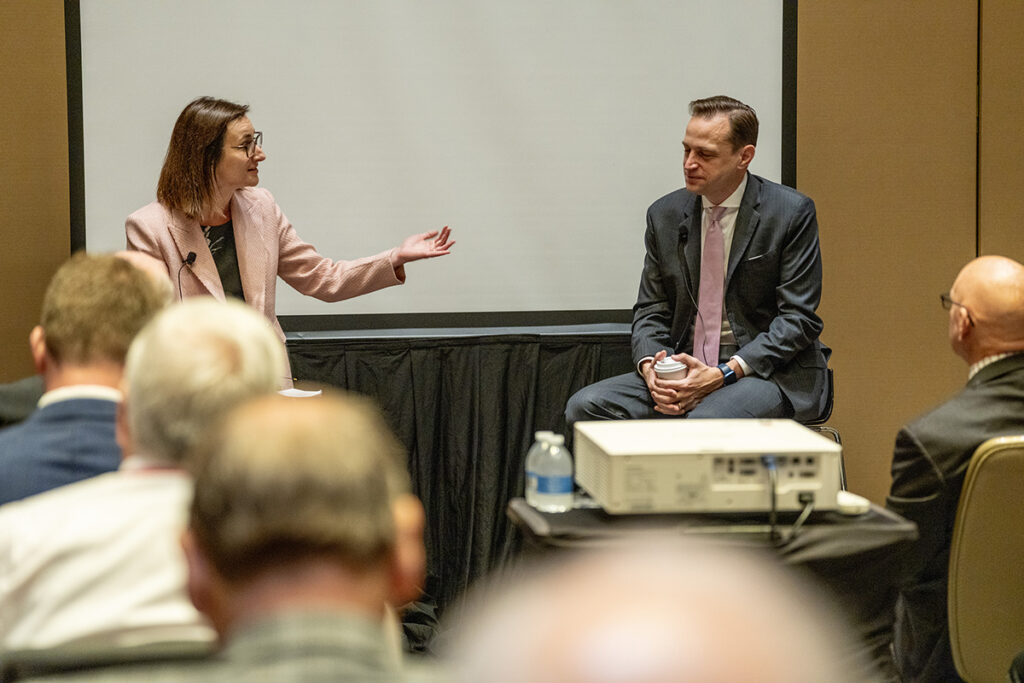WASHINGTON—Federal agency officials gave updates on a host of policy issues affecting electric cooperatives at NRECA’s 2025 Legislative Conference.
The meetings, held Tuesday, touched on the Environmental Protection Agency’s plans for key power sector regulations, as well as the direction of infrastructure funding programs at the Agriculture Department and Department of Energy.
The developments will be pivotal for electric co-ops as they prepare for increased electricity demand from data centers, manufacturing and other sources.
“Thanks to each and every one of you … for what you do every day to keep the lights on in rural America,” said Christopher McLean, assistant administrator for electric programs at the USDA’s Rural Utilities Service.
RUS ‘Open for Business’

McLean touted the USDA’s announcement in late March that it will honor previously obligated funding under its $9.7 billion Empowering Rural America (New ERA) and $1 billion Powering Affordable Clean Energy (PACE) programs. The programs provide grants and loans for innovative co-op energy projects.
“This is a very good piece of news because the amount of leverage that that investment is creating in rural America is very exciting,” he said.
In January, President Donald Trump directed agencies to review funding programs such as New ERA and PACE to determine whether they are consistent with his executive orders on energy.
On March 25, Agriculture Secretary Brooke Rollins gave co-ops 30 days to review and make voluntary changes to their New ERA and PACE project plans so they better align with the administration’s policy goals.
That 30-day period just closed, McLean said, and the department is reviewing the submissions and moving projects forward in the process. He added that some New ERA and PACE funds should start to flow in the near future.
McLean also noted that RUS is still processing loans under its traditional electric loan program and at interest rates that are “very, very good.”
“We are open for business,” he said.
DOE Gives More Time on GRIP Negotiations

Nick Elliot, the director of DOE’s Grid Deployment Office, gave co-ops a status update on the agency’s $10.5 billion Grid Resilience and Innovation Partnerships (GRIP) program.
Co-ops tapped for funding under the second round of GRIP previously faced an April 30 deadline to finish negotiations on their conditional awards. But Elliot said the DOE is providing an extra 120 days to wrap up negotiations in light of the administration’s review of GRIP.
“It’s great to hear that DOE is working through extending that out to allow more time as this funding review goes forward,” NRECA Regulatory Affairs Director Stephanie Crawford said at the meeting.
Elliot also gave his views on the Grid Deployment Office’s mission as co-ops gear up for higher demand.
“If you look at [President Donald Trump’s] agenda, he has this word dominance,” Elliot said. “For me, that means supply. How do we get more supply online, how do we get more transmission online, how do we get the right type of generation online?”
He also encouraged co-ops to engage with the DOE.
“Please, come see us,” Elliot said.
EPA to Revise Water Rules

Conference attendees also heard from the acting head of the EPA’s Office of Water, who used to work at an electric co-op.
“I kind of feel like I’m coming home to my people right now,” said Peggy Browne, acting assistant administrator of the EPA’s Office of Water. Prior to joining the EPA, Browne was manager of key accounts and government relations for Oregon Trail Electric Cooperative in Baker City, Oregon.
Browne said she supports having reliable, affordable power while protecting America’s waters. The EPA is looking to revise the Biden administration’s power plant wastewater rule finalized in 2024.
The EPA also recently sought input on ways to revise its definition of federally protected waters. NRECA submitted comments to the agency on how it could update the Biden administration’s Waters of the United States rule to provide clarity to co-ops.
“We don’t want regulation to unduly burden this sector,” Browne stated.
“It was heavily emphasized while working at Oregon Trail Electric Cooperative that it was our member-owners who would be directly affected by regulations,” she said. “Those are the people that will be paying the bills. So, every day as I approach water policy, I keep that in mind.”
As the EPA looks to craft new water rules, Browne stressed the need for durable policies that give co-ops more certainty.
“We’re trying to ensure that we’re hearing from everybody,” including energy producers, she said.
“We do want to get it right.”
More News From Legislative Conference:
Lawmakers Back Co-ops’ Push for Smart Energy Policies
Matheson Details Electric Co-ops’ Top Legislative Goals